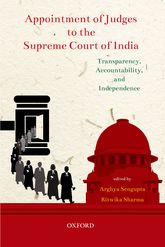Description
| In Supreme Court Advocates-on-Record Association v. Union of India [(2016) 5 SCC 1], a five-judge bench of the Supreme Court struck down the 99th Amendment to the Constitution and the National Judicial Appointments Commission (NJAC) Act, 2014, which replaced the existing collegium system with the NJAC, a new bipartisan model for appointing judges. This edited volume uses the judgment in the NJAC Case as a springboard to address the politics, doctrine, and developments pertaining to judicial appointments in India. It critically examines fundamental constitutional concepts such as rule of law, separation of powers, basic structure, and judicial independence which formed the basis of the judgment. It provides a rich and detailed history of post-Independence appointment of judges to locate the NJAC Case in its proper constitutional context. It also analyses reforms to judicial appointments in key South Asian and common law jurisdictions to understand what appointments in India might look like in the future. The volume has 21 essays across three parts—Part I provides an analysis of judicial appointments in India from the time prior to Independence to the present day, Part II analyses constitutional principles and their application in the NJAC Case, and Part III is a comparative enquiry into appointments processes in the United Kingdom, South Africa, Canada, Pakistan, Sri Lanka, and Nepal. |






Reviews
There are no reviews yet.